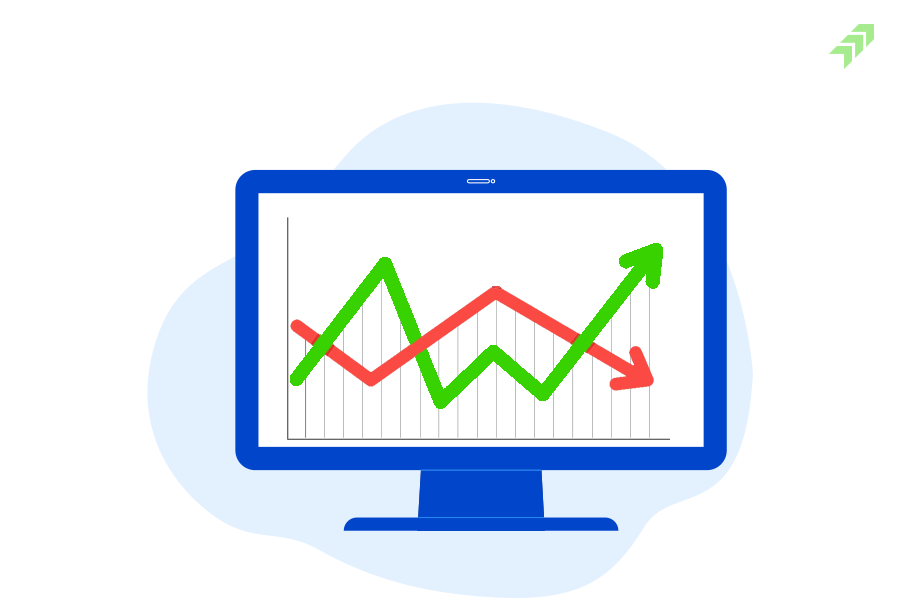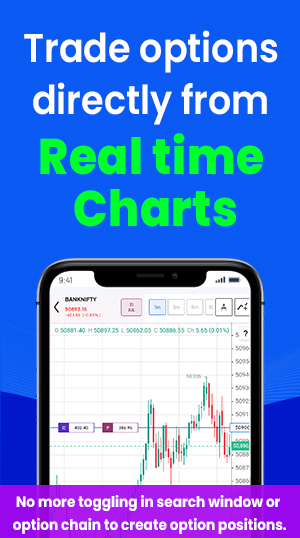The stock market does not always move in the same direction, sometimes it is in an up trend, sometimes in a downtrend and sometimes remains volatile making it difficult to trade. In bullish or bearish mode, creating a trade position is less risky, as you know the market is moving in a single direction but in volatile market conditions it is unexpected where it will settle.
In volatile market conditions, the index moves in both directions with long gap and swings with uncertain movements. Either it can end in the negative zone or settle at the positive zone, there are equal chances of moving in both directions. In such volatile market conditions, you cannot trade without a proper strategy to minimize the losses and maximize the chances of profits.
What is Volatility in the Stock Market?
The term volatility in the stock market directly refers to the magnitude and frequency of movement of price (index) in both directions (up and down). And the high frequency of price swings means the volatility in the market is higher.
While, on the other hand when the price of the market index remains stable not moving with more frequent ups and downs, then it shows volatility is low. The main reason for high volatility is uncertainty in the market with other factors like seasonality, cyclicality, market speculation, and unexpected events that also affect the market movement.
How to Know the Market is Volatile?
Apart from seeing the price movement on charts, you can also calculate whether the market is volatile or not. In charts, you can clearly the huge difference between upper and lower swings with both side’s significant movements showing the volatility in the market.
You can also measure the market volatility by finding the standard deviation of price changes over a period of time. The statistical data in terms of standard deviation shows the level of volatility over a period of time. Hence, you can calculate by taking the standard deviation and multiplying that by the square root of the number of periods.
To know whether the market is volatile or not, you can check data volatility index (VIX) data that contains a value in terms of percentage showing the level of volatility in the market. Usually, when the market is not volatile, the VIX is around 10% and when the volatility increases, it may go up to 20% and in certain extreme conditions it can touch around 30%.
However, it is difficult to gauge how much volatility is called a highly volatile market, as for different market indexes or different underlying securities the VIX could be different due to their composition and type of underlying security fluctuating on various economic activities.
The best way to know the market is volatile, take the average VIX of the index for a few months and compare it with the last few trading sessions of VIX. If the latest VIX is trading above the average VIX, then you can consider the market is volatile. Otherwise, to project the volatility for future price movement, you have to use the implied volatility that is calculated differently.
Is Volatility in the Market Good?
For long-term investors, volatility doesn’t matter, as they wait for months and many years to increase the value of their investment. But for intraday or short-term traders, volatility is risky and also provides a trading opportunity to earn profits in a short period.
High volatility means higher risk but having a higher potential of giving returns. While low volatility means low risk and lower returns. Hence, you should take the highly volatile market as an opportunity to trade with a high potential of getting quick returns.
How to Trade in a High Volatile Market?
Trading in a highly volatile market could be risky, but you have to take it as an opportunity and convert this high-risk opportunity into a profitable reward. Yes, for a volatile market, you need to be very careful to trade in a highly disciplined manner and follow some rules and strategies to pick the right stock at the right time and book the profits timely.
Keep Focus on Trending Stocks
During high market volatility, betting on trending stocks can give you some opportunity to book profits. As such stocks move in the same direction, even if the market is volatile, and that may be due to corporate actions, and strong fundamentals of the company. But you have to find out the best-trending stocks from the trending sector that is suitable for trading.
Keep an Eye on Breakouts
The stocks trading in the range breakouts give a wonderful opportunity for the traders to create a long position and take advantage of such price moves. Similarly, when the market is volatile and trading in the upper and lower range and suddenly breaks out from this trajectory, it is a good opportunity to enter into a long position that could be volatile in the market.
Stay Updated with News & Events
While trading in a volatile market, you need to stay updated with news, events, economic data and other activities like political factors that can influence the market movement. Because when volatility is high, the market is also very sensitive and overreacts to such news and events. Hence, keep an eye on such news and enter into trade positions accordingly.
Also Read: What are the Top Factors Affecting the Stock Market in India
Don’t Waste Time in Stock Selection
In a highly volatile market, if you start doing research like performing fundamental analysis or spending too much time on technical analysis and using multiple technical indicators to point out the buying and selling points, you can miss the opportunity.
Yes, for trading purposes always filter or screen some stock in your watch list, while trading don’t waste time on research and stock selection. As every single move is important and owing to high volatility the market index or stock can move rapidly eating your profit margins. Hence, grab the stock you find at lower eves, or having the momentum.
Trade within Your Risk Appetite
In a highly volatile market, the risk is very high, hence you should know how much money you can lose or loss you can incur losses. Are you mentally and financially ready to absorb such losses and overcome such damages due to unexpected moves?
Hence, always out that much money that is parked for your emergency needs, because there is no guarantee you will recover your money or how much time it will take to cover your losses if managed to execute the profitable trades in future.
Trade with a Disciplined Manner
Last but not least, although the market is highly volatile and can move in any direction trading in an undisciplined manner. But you have to be very disciplined while trading in such a volatile market. Yes before entering into any trade position, clearly define the entry and exit points or trading with stop-loss to minimize your risk and trade with the right strategy.
Also Read: Types of Risks Associated with Investing in the Stock Market
Trading Strategies for Volatile Market
In a volatile market, trading with the right strategy can help you take advantage of market instability and book profits. Apart from above said trading guidance for a highly volatile market, you also need to follow some technical trading strategies.
Keep Booking Profits
In a highly volatile market, it is not necessary for the market will move in a single direction for a long time, it can reverse anytime from anywhere, hence after entering into a trade position whatever profit you are getting book that. In quest of higher profits if you wait for more price movement you can lose your money if the market moves in the opposite direction.
Also Read: What is Profit Booking in Stock Market: Rules & Best Strategy
Go for Swing Trading
Mostly the movement of the market in volatility is between its previous support and resistance levels. The VIX remains fluctuating mainly within these ranges, providing a wonderful opportunity for traders to trade with a swing trading strategy.
Also Read: How to Select Stocks for Swing Trading: Stock Selection Strategy
In swing trading, you get a trading range between which you can buy and sell your stock or enter into a long or short position. However, owing to high volatility, market breakouts from such trading range, hence play with the best indicators for swing trading.
Use the Chart Patterns
Apart from checking the volatility index data, you can also analyse the charts like candlesticks that will show you a clear picture of the level of price movement due to volatility in the market. The series of candles or wicks or candles on the daily chart shows the price movement and a trading range between that you can trade to get the best results.
Also Read: How to Understand Chart Structure in TradingView: Explained
Perform Technical Analysis
For trading technical analysis is very important and in a volatile market, you must use this to analyse the market movement or predict the next move. This will not only help you to know the volatility levels but also the short-term trend and next move of the stock or underlying asset. There are various tools and technical indicators that help traders trade with the right strategy even when the market is trading in the volatile range.
Also Read: Technical Analysis vs Fundamental Analysis: Which is Better
Use Technical Indicators
There are various technical indicators, that are directly associated with the price movement of the market or stock. When you apply such technical indicators on the chart it will help you to know the right levels to enter or exit from the stock. Apart from price movement, you can also use volume and trend-related technical indicators to make your trading strategy more effective and successful.
Also Read: Top 5 Best Technical Indicators for Intraday or Day Trading
Trade with Short-term Strategies
When the market is in a highly volatile condition you should avoid intraday trading, instead trade with short-term trading strategies that can give returns in a few days. In a short-term trading strategy, you will get the opportunity to wait if the market does not move as per your expectations, and there is also a chance that volatility can bring the market to the same levels.
Also Read: Short Term trading v/s Intraday trading: which one is more profitable
Trade in Option Strategies
One of the best ways to trade in the highly volatile market conditions is to trade in the derivatives market, where you will get more options to trade in future and options with a month to three-month time horizon with high leverage of trading.
You can choose and trade in various option strategies as per the market conditions and get high leverage with the advantage of extraordinary price movement due to the volatilely of the market. You can long puts, short calls, short straddles or strangles or trade with ratio writing like option trading strategies that work in a volatile market.
A stock trading in the option market or price of the Nifty option chain is already a highly volatile index giving the best opportunity for the traders to enjoy the power of high returns with high risk of trading. You can choose Nifty Future, Bank Nifty Future, Index Options and Stock Future & Options with the best trading strategies for highly volatile, bullish and bearish markets.
Summing-up
Trading in a volatile market is already a risky job, as the market can unexpectedly move in any direction. At the same time, it is better than the consolidated market movement, at least providing trading opportunities for the traders to bet on the volatile stocks or take advantage of swings in the main index and book quick profits.
The market becomes volatile when there is uncertainty among the investors and traders. To trade in a volatile market you need to follow certain right trading strategy that can work in a highly volatile market. To know about such trading strategies you need the best trading platform and a discount broker or full-fledge broker that can provide you with such trading platform.
You can choose Moneysukhproviding the best online trading platform to trade or invest in equities, commodities and currency. It is one of the best discount brokers in India where you can open a demat account at the lowest brokerage charges with the best features. So what are you waiting for open the trading account and enjoy the best trading experience?
Also Read: Choosing the right broker: Decoding the mystery of lowest brokerage charges

















